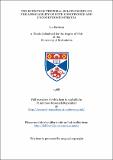Files in this item
The effects of temporal relationships on the associability of both conditioned and unconditioned stimuli
Item metadata
| dc.contributor.advisor | Garrud, Paul | |
| dc.contributor.advisor | Morris, Richard | |
| dc.contributor.author | Davison, Ian | |
| dc.coverage.spatial | 232 p. | en_US |
| dc.date.accessioned | 2018-07-09T08:14:48Z | |
| dc.date.available | 2018-07-09T08:14:48Z | |
| dc.date.issued | 1988 | |
| dc.identifier.uri | https://hdl.handle.net/10023/15083 | |
| dc.description.abstract | Several models of animal associative learning are described. The evidence for the concept of associability is reviewed. The review contains a detailed account of blocking, including the Mackintosh, Bygrave and Picton (1977) experiment. It is shown that the two major associability models need to be modified, mathematically, to simulate the results of this experiment. A general, simple framework for investigating putative associability changes is suggested. A review of stimulus pre-exposure effects is put into this framework, and indicates a suitable direction for research. The experiments looked for associability changes of both conditioned and unconditioned stimuli. Sometimes the stimulus was a predictor of subsequent events; if not, it was predicted by another stimulus. A variety of procedures was employed. Experiments 1, 2, and 3 tried to replicate and extend previous work with a conditioned stimulus predicting subsequent events, but they were unsuccessful. Experiments 4, 5, 6, 7, and 8 investigated whether conditioned and unconditioned stimuli would change in associability when they were well predicted. Unfortunately, the data were difficult to interpret. An appetitive-aversive transfer paradigm was used in Experiments 9, 10, and 11; there was some evidence that a tone could change in associability, both when it was acting as a predictor, and when it was being predicted. Alternative Interpretations were also discussed. In Experiments 12 and 13, a shock was used to predict the occurrence of food; and there was no evidence that the associability of the shock could be increased in this way. | en_US |
| dc.language.iso | en | en_US |
| dc.publisher | University of St Andrews | |
| dc.subject.lcc | QL785.D2 | |
| dc.subject.lcsh | Comparative Psychology | en |
| dc.title | The effects of temporal relationships on the associability of both conditioned and unconditioned stimuli | en_US |
| dc.type | Thesis | en_US |
| dc.contributor.sponsor | Biotechnology and Biological Sciences Research Council (BBSRC) | en_US |
| dc.type.qualificationlevel | Doctoral | en_US |
| dc.type.qualificationname | PhD Doctor of Philosophy | en_US |
| dc.publisher.institution | The University of St Andrews | en_US |
This item appears in the following Collection(s)
Items in the St Andrews Research Repository are protected by copyright, with all rights reserved, unless otherwise indicated.

